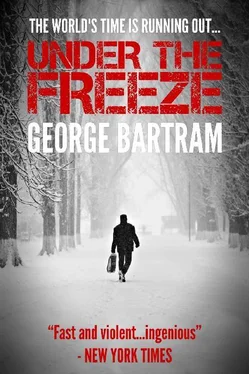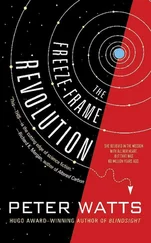It was Kinsella, the bureaucrat who had signed his journalist’s card.
But … He tried to think, but he was unconscious.
He was in a moving car. He had been unconscious; now he was coming to. It was still night. Lights passed over his face, coming and going with the regularity of heartbeat. The lights stopped coming, and they drove into darkness. Cold air blew over him and he slept again.
He awoke to find no movement. He smelled oil, machinery. There was a naked light to his left, far away.
Then he was being lifted. He felt hands on his ankles and under his arms; there was a voice cursing in Spanish.
Bright light. He winced. The light searched out his eyes and one eye was forced open. He tried to speak, but his tongue was too slow and too thick. The light left his face and moved to his left arm. There was more muttering, more cursing in Spanish, the sound of ripping fabric. He felt another injection.
A face came close to his.
“Do not come back to Argentina,” a voice said. The face and the voice were connected.
The lights went off and he dropped into unconsciousness. His dreams were ugly. He came up toward waking sometimes, enough to feel cold and to resent the constant yammer of jet engines, but he would sink away again. Outside time, outside thought. He felt pain and nausea — and fear. Not fear of anything specific. Simply fear. He told himself that the drug was doing that to him, but knowing it did no good. He was still afraid.
When the floor tilted under him and he could feel the world dropping, he was more fully awake, and he knew that he was in an aircraft that was on a final approach. The fear started to focus on crashing, but he talked himself away from it; he talked himself and the aircraft down, through the final turns, down to the runway. The tires screeched and he told himself that he was on the ground and safe, but he was still afraid.
There was a sound of small motors and of moving metal. Warmer air bathed over him as the plane slowed. He smelled something rank, organic. The plane stopped altogether and then rolled forward again, turning in a tight arc, rolling off a hard surface and then stopping again.
“Quickly,” a voice said in Spanish.
Hands pushed on his left shoulder and left hip. He began to roll over, paused, rolled, and dropped heavily.
The drop had only been about four feet. He landed on his right hip and his shoulder and his face and he had the breath knocked out of him. Engines deafened him. He tried to turn his head. There was a dark rectangle above him with many small lights in it. As he looked, the lights began to move and the rectangle got narrower.
Bomb bay .
He was lying on sand and scrub grass. The plane passed over him and went away, out of his field of vision, leaving him in the marshy night. He managed to roll on his back and look up at the sky. After a while, he believed that these were not the stars of Argentina.
Other aircraft landed and took off next to him. He would hear them coming behind him and then their great wings would pass over him.
Pass me by , angel of death . Pass me by .
What time is it ?
When he was able to lift his arms, he tried to look at his watch, but it had been smashed. He felt the back of his head, which had a lump, and then he felt his pockets, which still held his papers and his money and a key to a Buenos Aires hotel room. Half an hour after that, he was able to roll to his left side, then to his belly, and slowly to draw his legs up so that he was on his face and his knees. He threw up. He rolled back on his haunches and lay like that for a while. Only two planes came by, and they seemed not to see him in the ruin of his tight black evening suit.
After he had sat there for a while, he crawled away from the runway like a crab. The sand hurt his palms and his knees. He thought he was crawling in a straight line, but he was not. He threw up again and then lay in the sand for a while.
Eventually he reached a chain-link fence. He could have slept by then, he was sure, but he thought that if he could get over the fence, he could get away from whatever he was afraid of, which had become a blond angel in an airplane, at least some of the time. Being inside the fence with it had to be worse than being outside the fence. Although inside and outside were only relative terms.
Getting over the fence was very difficult. There were green plastic ribbons woven through the diagonal openings, and his fingers kept tangling in them and the wire. It was not a very serious fence, for it had no barbed wire on the top, but it was very difficult for him to climb nonetheless. Falling off the top on the other side was easy by comparison. He lay next to the fence, looking at the stars again. The aircraft were taking off some distance away from him now, and he wondered how they had moved the runway.
There was a swamp a few feet from the fence. He knew the smell and the sound of it. He knew the tree silhouettes that were beginning to show as the sky brightened with dawn.
“Onward and upward,” he said. Or thought he said.
He staggered along the fence, using it as a support. The fence came to a road; the road headed straight for the dawn.
“Big night?” somebody said. The voice was too cheerful to be his own. With difficulty, he turned his head. There was a pickup truck and a young man with a neck like a ham and a head with a baseball cap on it. Tarp tried to say something but failed.
“Man, you really been on one! Git in here, ’fore you die !” The young man laughed. Tarp crawled to the door of the pickup, tried to stand up, missed the door, and crashed into the door frame so that he fell facedown on the slippery seat. The boy laughed again and then said, “Aw, shit” with disgust. “Hey, man, you okay?”
Tarp looked up. He formed a word very carefully. “Yeah,” he said after several seconds.
“Well, git in !”
Tarp put his hands on the seat directly under his shoulders and pushed, then pulled a foot up and braced it in the door frame, then pushed and pulled and got his body in. The boy reached across and slammed the door. “Hey, man, that musta been a party. I mean, some kinda party! Jeez! Holy shit, a tuxedo and ever’thin’, no shit! Where you been at, man?”
Tarp got his mouth ready and said, “Buenosh Airesh.” The boy howled and hit the steering wheel with his fist. They were tearing down a narrow road and Tarp was trying not to be frightened. He shut his eyes. “Huh?” he said when he realized the boy had been talking to him.
“I said, you wanna go into Orlando or don’t you?”
“Huh?”
“Orlando, man, you wanna go t’Orlando or not?”
He thought he knew what Orlando was. A city. A city would have death squads and angels. “No,” he said.
“Okay, but you don’t look so good to be trompin’ ’round the roads, ’f you don’t mind me saying. I mean, you look like twenty-four hours in the sack would be mucho help, you know what I mean?”
Tarp tried to make a smile. After a while, the boy stopped the truck and let him out. He leaned against a palmetto and threw up again, and then he sat for a while and watched a lizard. He took off the dinner jacket and emptied the pockets and tossed the jacket away, then ripped the sleeves from the white shirt and threw them away. He had a French passport, a Jockey Club card, some other papers, a penknife, and a lot of Argentine pesos.
A black child came down the road. When she got opposite him, she stopped and looked. After a long time, she said, “You sick?”
“Feels like it.” He was able to talk more clearly.
“Look like it, too.” She went away.
Читать дальше












